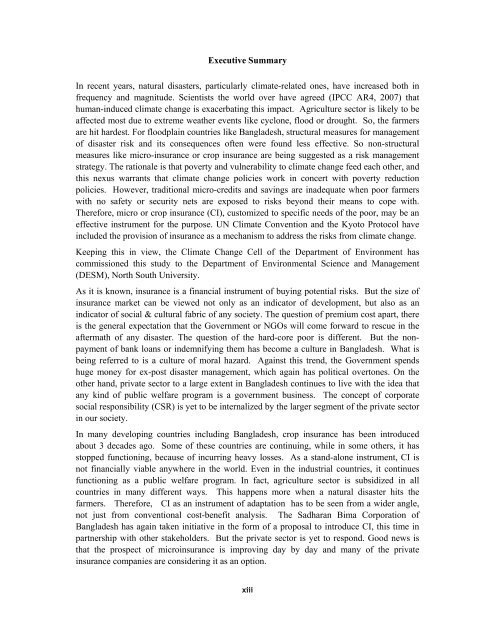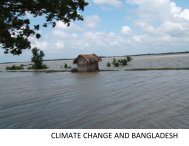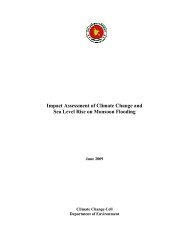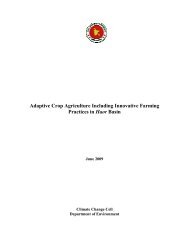Crop Insurance as a Risk Management Strategy in Bangladesh
Crop Insurance as a Risk Management Strategy in Bangladesh
Crop Insurance as a Risk Management Strategy in Bangladesh
You also want an ePaper? Increase the reach of your titles
YUMPU automatically turns print PDFs into web optimized ePapers that Google loves.
Executive Summary<br />
In recent years, natural dis<strong>as</strong>ters, particularly climate-related ones, have <strong>in</strong>cre<strong>as</strong>ed both <strong>in</strong><br />
frequency and magnitude. Scientists the world over have agreed (IPCC AR4, 2007) that<br />
human-<strong>in</strong>duced climate change is exacerbat<strong>in</strong>g this impact. Agriculture sector is likely to be<br />
affected most due to extreme weather events like cyclone, flood or drought. So, the farmers<br />
are hit hardest. For floodpla<strong>in</strong> countries like <strong>Bangladesh</strong>, structural me<strong>as</strong>ures for management<br />
of dis<strong>as</strong>ter risk and its consequences often were found less effective. So non-structural<br />
me<strong>as</strong>ures like micro-<strong>in</strong>surance or crop <strong>in</strong>surance are be<strong>in</strong>g suggested <strong>as</strong> a risk management<br />
strategy. The rationale is that poverty and vulnerability to climate change feed each other, and<br />
this nexus warrants that climate change policies work <strong>in</strong> concert with poverty reduction<br />
policies. However, traditional micro-credits and sav<strong>in</strong>gs are <strong>in</strong>adequate when poor farmers<br />
with no safety or security nets are exposed to risks beyond their means to cope with.<br />
Therefore, micro or crop <strong>in</strong>surance (CI), customized to specific needs of the poor, may be an<br />
effective <strong>in</strong>strument for the purpose. UN Climate Convention and the Kyoto Protocol have<br />
<strong>in</strong>cluded the provision of <strong>in</strong>surance <strong>as</strong> a mechanism to address the risks from climate change.<br />
Keep<strong>in</strong>g this <strong>in</strong> view, the Climate Change Cell of the Department of Environment h<strong>as</strong><br />
commissioned this study to the Department of Environmental Science and <strong>Management</strong><br />
(DESM), North South University.<br />
As it is known, <strong>in</strong>surance is a f<strong>in</strong>ancial <strong>in</strong>strument of buy<strong>in</strong>g potential risks. But the size of<br />
<strong>in</strong>surance market can be viewed not only <strong>as</strong> an <strong>in</strong>dicator of development, but also <strong>as</strong> an<br />
<strong>in</strong>dicator of social & cultural fabric of any society. The question of premium cost apart, there<br />
is the general expectation that the Government or NGOs will come forward to rescue <strong>in</strong> the<br />
aftermath of any dis<strong>as</strong>ter. The question of the hard-core poor is different. But the nonpayment<br />
of bank loans or <strong>in</strong>demnify<strong>in</strong>g them h<strong>as</strong> become a culture <strong>in</strong> <strong>Bangladesh</strong>. What is<br />
be<strong>in</strong>g referred to is a culture of moral hazard. Aga<strong>in</strong>st this trend, the Government spends<br />
huge money for ex-post dis<strong>as</strong>ter management, which aga<strong>in</strong> h<strong>as</strong> political overtones. On the<br />
other hand, private sector to a large extent <strong>in</strong> <strong>Bangladesh</strong> cont<strong>in</strong>ues to live with the idea that<br />
any k<strong>in</strong>d of public welfare program is a government bus<strong>in</strong>ess. The concept of corporate<br />
social responsibility (CSR) is yet to be <strong>in</strong>ternalized by the larger segment of the private sector<br />
<strong>in</strong> our society.<br />
In many develop<strong>in</strong>g countries <strong>in</strong>clud<strong>in</strong>g <strong>Bangladesh</strong>, crop <strong>in</strong>surance h<strong>as</strong> been <strong>in</strong>troduced<br />
about 3 decades ago. Some of these countries are cont<strong>in</strong>u<strong>in</strong>g, while <strong>in</strong> some others, it h<strong>as</strong><br />
stopped function<strong>in</strong>g, because of <strong>in</strong>curr<strong>in</strong>g heavy losses. As a stand-alone <strong>in</strong>strument, CI is<br />
not f<strong>in</strong>ancially viable anywhere <strong>in</strong> the world. Even <strong>in</strong> the <strong>in</strong>dustrial countries, it cont<strong>in</strong>ues<br />
function<strong>in</strong>g <strong>as</strong> a public welfare program. In fact, agriculture sector is subsidized <strong>in</strong> all<br />
countries <strong>in</strong> many different ways. This happens more when a natural dis<strong>as</strong>ter hits the<br />
farmers. Therefore, CI <strong>as</strong> an <strong>in</strong>strument of adaptation h<strong>as</strong> to be seen from a wider angle,<br />
not just from conventional cost-benefit analysis. The Sadharan Bima Corporation of<br />
<strong>Bangladesh</strong> h<strong>as</strong> aga<strong>in</strong> taken <strong>in</strong>itiative <strong>in</strong> the form of a proposal to <strong>in</strong>troduce CI, this time <strong>in</strong><br />
partnership with other stakeholders. But the private sector is yet to respond. Good news is<br />
that the prospect of micro<strong>in</strong>surance is improv<strong>in</strong>g day by day and many of the private<br />
<strong>in</strong>surance companies are consider<strong>in</strong>g it <strong>as</strong> an option.<br />
xiii





